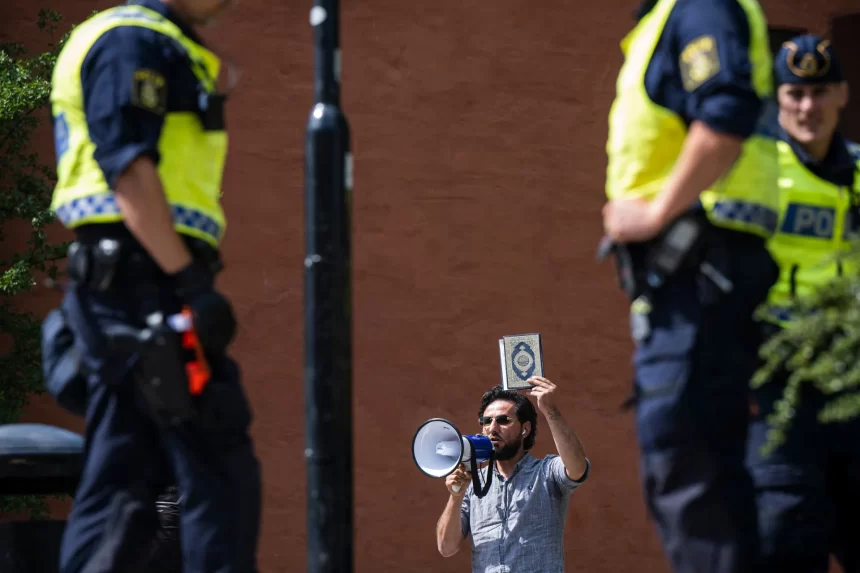On Wednesday and the first day of Eid Al Adha, a protestor desecrated a Quran outside Stockholm’s central mosque in Sweden.
Qatar has issued a robust condemnation against the Swedish authorities’ decision to permit the burning of the Holy Qur’an in Stockholm, after a protestor publicly desecrated the holy text on the first day of Eid Al Adha.
In a statement on Thursday, Qatar’s Ministry of Foreign Affairs highlighted that the occurrence of such actions under the veneer of freedom of speech incites hatred and violence, undermines peaceful coexistence, and lays bare a hypocritical double standard.
“The State of Qatar stresses that this heinous incident is an act of incitement and a serious provocation to the feelings of more than two billion Muslims in the world, especially during Eid Al-Adha,” it read.
The ministry also issued a warning concerning the rising tide of Islamophobic rhetoric and hate campaigns against Islam, which are intensifying along with the persistent, systematic targeting of Muslims all around the world.
“The Ministry renews the State of Qatar’s total rejection of all forms of hate speech based on belief, race or religion, and the involvement of sanctities in political disputes. It also warns that hate campaigns against Islam and Islamophobia discourse are a serious witness to the continuation of the systematic calls for targeting Muslims in the world.”
Qatar has called on the global community to shoulder the responsibility of countering hatred, discrimination and violence.
It underlined the pressing need to foster dialogue and mutual understanding as well as reiterating the country’s unwavering support for the principles of tolerance and peaceful coexistence, demonstrating its commitment to bolstering international peace and security through dialogue and understanding.
In similar vein, the Organisation of Islamic Cooperation (OIC) voiced its firm disapproval of the act, warning against the severe implications of such actions, which oppose global efforts to promote tolerance, moderation and the rejection of extremism.
The Arab League also joined in the condemnation of Sweden’s decision to allow extremists to desecrate a copy of the Holy Quran, holding the government accountable for the outcomes and repercussions of the act.
In a statement issued on Wednesday, the Secretary-General of the Arab League, Ahmed Aboul Gheit, reprimanded Swedish authorities for their laxity towards such act, despite the widespread understanding of the consequences of escalating hatred and bigotry.
He stated that government responsibility extends beyond merely tolerating or inciting extremism to actively counter these harmful tendencies.
Meanwhile, Morocco withdrew its ambassador to Sweden on Wednesday in response to the incident for an indefinite period.
“Gruesome act”
On Wednesday, at the onset of the Muslim festival of Eid al-Adha, a 37 year old Iraqi migrant publicly desecrated a Quran outside Stockholm’s central mosque.
The instigator of the act who is advocating for the prohibition of the Quran, proceeded to tear pages from the holy text, soil them with his shoe, and set them aflame, according to a report by Swedish public broadcaster SVT.
A crowd of approximately 200 spectators, which included counterprotesters, stood watching, according to local news. A man was taken into custody following an attempt to throw a rock during the event.
The judicial approval for this act was conferred on Wednesday, reaffirming Sweden’s policy of hardly prohibiting protests, even those that may be regarded as potentially inflammatory elsewhere.
The desecration of the Islamic sacred text occurred amidst Eid al-Adha, one of the most significant observances in the Islamic calendar.
Swedish authorities response
Swedish court stipulated that a distinct correlation must exist between potential security issues and the intended assembly for protests. According to Swedish broadcaster TV4, the police did not perceive such a connection in this instant.
“The security risks and consequences that the authorities can see connected to a Quran burning are not of such a nature that according to the current law they give grounds for a decision to reject a request for a general gathering,” the court said.
“Police authorities, therefore, give you permission for the requested gathering,” it added.







